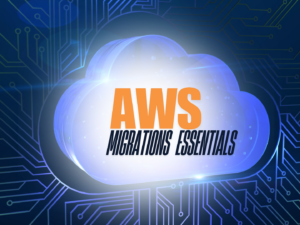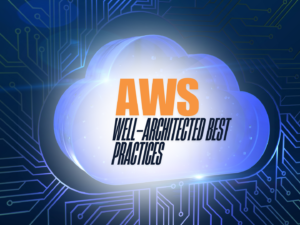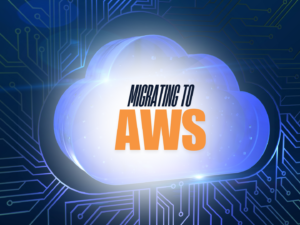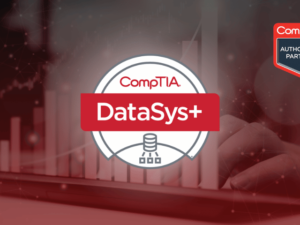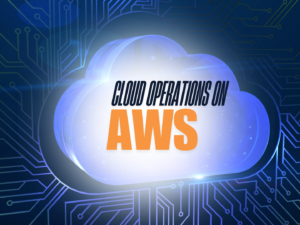DEVOPS ENGINEERING ON AWS
- Description
- Reviews
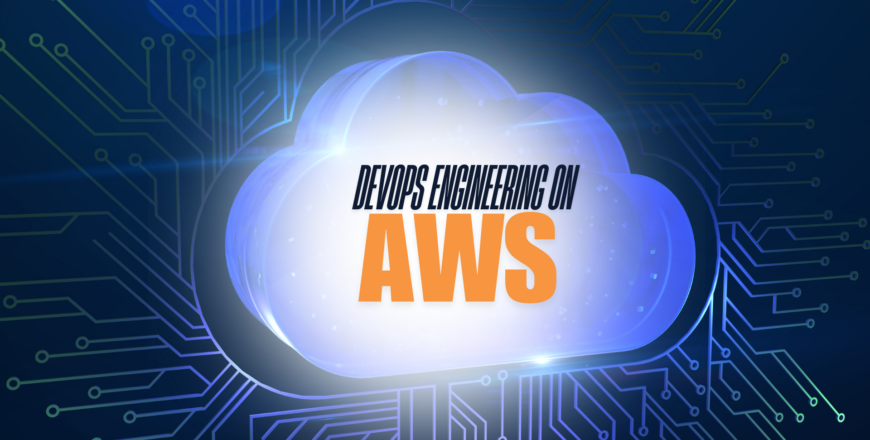
Course Overview
Introduction
This course provides a comprehensive understanding of DevOps principles and best practices using AWS. It equips corporate IT teams with the necessary skills to automate, deploy, and manage applications efficiently in cloud environments.
Business Relevance
Organizations increasingly rely on cloud-based solutions to enhance agility, security, and efficiency. This training helps IT teams leverage AWS DevOps services to streamline workflows, improve deployment pipelines, and ensure system reliability.
Target Area
Cloud management, IT automation, and continuous integration/continuous deployment (CI/CD) for enterprise operations.
What You’ll Learn & Who Should Enroll
Key Topics Covered:
- AWS DevOps Fundamentals: Understanding DevOps principles and their implementation in AWS environments.
- CI/CD Pipelines: Automating software release processes with AWS CodePipeline, CodeBuild, and CodeDeploy.
- Infrastructure as Code (IaC): Using AWS CloudFormation and Terraform to automate infrastructure provisioning.
- Monitoring & Logging: Leveraging AWS CloudWatch, CloudTrail, and other monitoring tools for system health and performance insights.
- Security & Compliance: Implementing security best practices and governance controls within AWS DevOps workflows.
Ideal Participants:
This course is designed for:
- DevOps Engineers – Professionals managing infrastructure and application deployments using AWS tools and best practices.
- Cloud Engineers – IT professionals specializing in cloud solutions who want to enhance DevOps practices in the cloud.
- Systems Administrators – Individuals overseeing system and network infrastructure who want to transition to DevOps methodologies on AWS.
- Software Developers – Developers seeking to integrate DevOps principles into their application development lifecycle on AWS.
Business Applications & Next Steps
Key Business Impact:
- Enhanced Security & Compliance: Implement robust measures to safeguard your organization.
- Improved IT Governance: Establish best practices for IT management and risk mitigation.
- Operational Efficiency: Drive digital transformation and optimize IT service management.
Next-Level Training:
To further build expertise, consider:
- AWS Certified DevOps Engineer – Professional: Advanced concepts and hands-on labs for mastering AWS DevOps.
- Cloud Security & Compliance Training: In-depth training on securing cloud workloads and meeting compliance requirements.
Why Choose Acumen IT Training?
- Enterprise-Focused Curriculum: Designed specifically for the challenges and demands of corporate IT environments.
- Qualified-Led Training: Learn from seasoned industry professionals with extensive real-world experience.
- Business-Driven Learning: Benefit from practical applications that directly impact your organization’s performance.
- Flexible Training Options: Choose from Online, Hybrid Training, Instructor-Led On-Site (at your location or ours), and Corporate Group Sessions.
For the full course outline, schedules, and private corporate training inquiries, contact us at Acumen IT Training.
Course Outline
COURSE OBJECTIVES
- Use DevOps best practices to develop, deliver, and maintain applications and services at high velocity on AWS
- List the advantages, roles, and responsibilities of small autonomous DevOps teams
- Design and implement an infrastructure on AWS that supports DevOps development projects
- Leverage AWS Cloud9 to write, run and debug your code
- Deploy various environments with AWS CloudFormation
- Host secure, highly scalable, and private Git repositories with AWS CodeCommit
- Integrate Git repositories into CI/CD pipelines
- Automate build, test, and packaging code with AWS CodeBuild
- Securely store and leverage Docker images and integrate them into your CI/CD pipelines
- Build CI/CD pipelines to deploy applications on Amazon EC2, serverless applications, and container-based applications
- Implement common deployment strategies such as “all at once,” “rolling,” and “blue/green”
- Integrate testing and security into CI/CD pipelines
- Monitor applications and environments using AWS tools and technologies
TRAINING INCLUSIONS
- Comprehensive training materials and reference guides.
- Hands-on lab exercises with real-world AWS DevOps scenarios.
- DevOps Engineering on AWS Certificate of Training Completion.
- Access to AWS DevOps tools and services during training.
- 30 Days Post-Training Support.
COURSE OUTLINE
Module 0: Course overview
Module 1: Introduction to DevOps
Module 2: Infrastructure Automation
Module 3: AWS Toolkits
Module 4: Continuous integration and continuous delivery (CI/CD) with development tools
Module 5: Continuous integration and continuous delivery (CI/CD) with development tools
Module 6: Introduction to Microservices
Module 7: DevOps and containers
Module 8: DevOps and serverless computing
Module 9: Deployment strategies
Module 10: Automated testing
Module 11: Security automation
Module 12: Configuration management
Module 13: Observability
Module 14: Reference architecture (Optional module)
Module 15: Course summary
For FULL COURSE OUTLINE, please contact us.
Inquire now for schedules and private class bookings.
FAQs
- What is DevOps Engineering on AWS training?
This course covers AWS tools and best practices for automating infrastructure, continuous integration/continuous deployment (CI/CD), monitoring, and security in cloud environments. - Who is this training for?
It is designed for software developers, system administrators, and DevOps professionals looking to enhance their AWS DevOps skills. - Do I need prior AWS experience to take this course?
Yes, participants should have foundational AWS knowledge and experience in system administration or software development. - What skills will I learn in this training?
You will gain expertise in CI/CD pipelines, infrastructure as code (IaC), monitoring, security automation, and performance optimization. - How long is the training program?
The training spans five days, combining theoretical knowledge with hands-on labs and case studies. - What is the format of the certification exam?
The exam consists of multiple-choice and scenario-based questions evaluating AWS DevOps knowledge and skills. - Is this training available online?
Yes, we offer both online and in-person training options. - How will DevOps Engineering on AWS training benefit my career?
AWS DevOps expertise is in high demand, leading to roles such as DevOps Engineer, Cloud Automation Specialist, and Site Reliability Engineer (SRE). - How long is the certification valid?
The certification is valid for three years and can be renewed through AWS upskilling programs. - What career opportunities are available after completing this training?
This training opens opportunities for roles such as AWS DevOps Engineer, Cloud Infrastructure Engineer, and Automation Specialist.
Real-World Applications of DevOps Engineering on AWS
Case Study 1: Automating Infrastructure Deployment
Challenge: A tech company faced delays in deploying infrastructure for new applications due to manual provisioning.
Solution: The team implemented AWS CloudFormation and AWS CodeDeploy to automate infrastructure provisioning and application deployment.
Result:
✅ Reduced deployment time from hours to minutes
✅ Improved infrastructure consistency and reliability
✅ Minimized human errors in configuration
Case Study 2: Enhancing Application Reliability with CI/CD
Challenge: A financial services company struggled with frequent application failures due to manual deployments.
Solution: AWS CodePipeline and AWS CodeBuild were used to create an automated CI/CD pipeline, enabling continuous testing and deployment.
Result:
✅ 90% reduction in deployment failures
✅ Faster release cycles with automated testing
✅ Increased developer productivity
Use Case 1: Monitoring and Logging with AWS
Organizations can use AWS CloudWatch and AWS X-Ray to monitor application performance and troubleshoot issues in real-time.
✅ Improved system uptime and reliability
✅ Faster issue resolution with detailed logs and insights
Use Case 2: Security Automation with AWS DevOps Tools
AWS DevOps teams can integrate AWS Security Hub and AWS IAM for automated compliance and security enforcement.
✅ Reduced security risks with automated access controls
✅ Continuous compliance monitoring for cloud workloads
Why These Case Studies Matter for You
By mastering AWS DevOps practices, you can automate workflows, improve system reliability, and optimize cloud operations, making you a valuable asset in any organization.
🔗Enroll today and become an expert in DevOps Engineering on AWS!
Testimonials: What Professionals Say About Our DevOps Engineering on AWS
⭐ ⭐ ⭐ ⭐ ⭐ “Transformed Our DevOps Practices!”
“This course helped us implement CI/CD pipelines and automate deployments, significantly reducing downtime!”
— Kevin R., DevOps Engineer, IT Industry
⭐ ⭐ ⭐ ⭐ ⭐ “A Must for DevOps Professionals!”
“The hands-on labs provided practical experience, and I was able to apply AWS automation tools immediately at work.”
— Paul M., Cloud Automation Specialist, Software Development
⭐ ⭐ ⭐ ⭐ ⭐ “Boosted My Cloud Engineering Career!”
“After completing this training, I landed a new role as an AWS DevOps Engineer. Highly recommended!”
— Daniel C., Site Reliability Engineer, Financial Sector
Request a Quote
Popular Courses
Archive
Working hours
| Monday | 9:00 am - 6.00 pm |
| Tuesday | 9:00 am - 6.00 pm |
| Wednesday | 9:00 am - 6.00 pm |
| Thursday | 9:00 am - 6.00 pm |
| Friday | 9:00 am - 6.00 pm |
| Saturday | Closed |
| Sunday | Closed |

